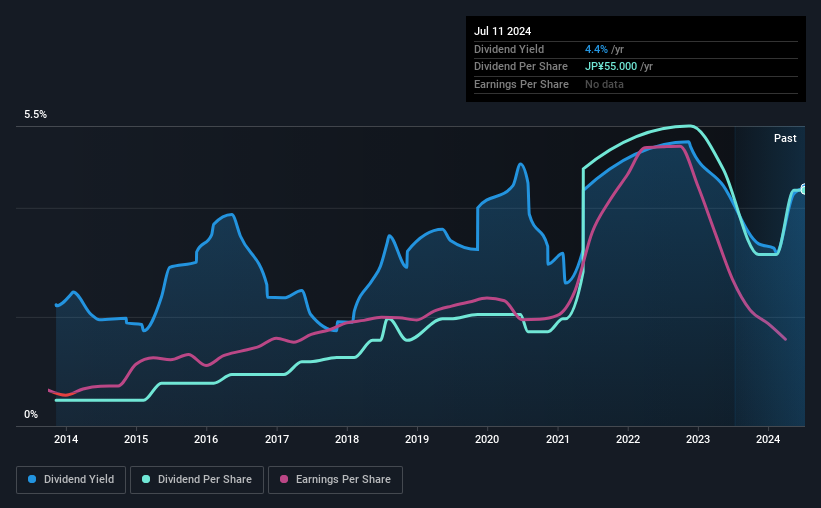
The board of Daiki Aluminium Industry Co., Ltd. (TSE:5702) has announced that it will pay a dividend on the 5th of December, with investors receiving ¥25.00 per share. The yield is still above the industry average at 4.4%.
View our latest analysis for Daiki Aluminium Industry
Daiki Aluminium Industry's Payment Has Solid Earnings Coverage
Impressive dividend yields are good, but this doesn't matter much if the payments can't be sustained. Based on the last payment, Daiki Aluminium Industry's earnings were much higher than the dividend, but it wasn't converting those earnings into cash flow. Since a dividend means the company is paying out cash to investors, this could prove to be a problem in the future.
EPS is set to fall by 8.1% over the next 12 months if recent trends continue. However, if the dividend continues along recent trends, we estimate the payout ratio could reach 75%, meaning that most of the company's earnings is being paid out to shareholders.

Dividend Volatility
Although the company has a long dividend history, it has been cut at least once in the last 10 years. The annual payment during the last 10 years was ¥6.00 in 2014, and the most recent fiscal year payment was ¥55.00. This means that it has been growing its distributions at 25% per annum over that time. It is great to see strong growth in the dividend payments, but cuts are concerning as it may indicate the payout policy is too ambitious.
Dividend Growth May Be Hard To Come By
Given that the dividend has been cut in the past, we need to check if earnings are growing and if that might lead to stronger dividends in the future. Daiki Aluminium Industry has seen earnings per share falling at 8.1% per year over the last five years. If the company is making less over time, it naturally follows that it will also have to pay out less in dividends.
The Dividend Could Prove To Be Unreliable
Overall, it's not great to see that the dividend has been cut, but this might be explained by the payments being a bit high previously. While the low payout ratio is a redeeming feature, this is offset by the minimal cash to cover the payments. We don't think Daiki Aluminium Industry is a great stock to add to your portfolio if income is your focus.
Companies possessing a stable dividend policy will likely enjoy greater investor interest than those suffering from a more inconsistent approach. At the same time, there are other factors our readers should be conscious of before pouring capital into a stock. To that end, Daiki Aluminium Industry has 4 warning signs (and 1 which doesn't sit too well with us) we think you should know about. Is Daiki Aluminium Industry not quite the opportunity you were looking for? Why not check out our selection of top dividend stocks.
New: Manage All Your Stock Portfolios in One Place
We've created the ultimate portfolio companion for stock investors, and it's free.
• Connect an unlimited number of Portfolios and see your total in one currency
• Be alerted to new Warning Signs or Risks via email or mobile
• Track the Fair Value of your stocks
Have feedback on this article? Concerned about the content? Get in touch with us directly. Alternatively, email editorial-team (at) simplywallst.com.
This article by Simply Wall St is general in nature. We provide commentary based on historical data and analyst forecasts only using an unbiased methodology and our articles are not intended to be financial advice. It does not constitute a recommendation to buy or sell any stock, and does not take account of your objectives, or your financial situation. We aim to bring you long-term focused analysis driven by fundamental data. Note that our analysis may not factor in the latest price-sensitive company announcements or qualitative material. Simply Wall St has no position in any stocks mentioned.
Have feedback on this article? Concerned about the content? Get in touch with us directly. Alternatively, email editorial-team@simplywallst.com
About TSE:5702
Daiki Aluminium Industry
Manufactures, processes, markets, and sells aluminium alloy products in Japan and internationally.
Average dividend payer slight.
Market Insights
Community Narratives



